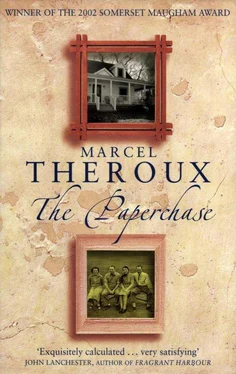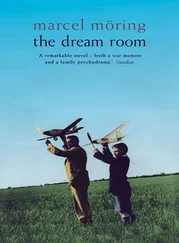She fanned her face with her hand. ‘I can’t bear this weather. There’s nowhere for the heat to go.’ She was very pale, except for her cheeks, where the red was unhealthily intense, as though they had been scrubbed too hard. Her light brown hair was very fine, like a toddler’s, and had been cut short.
By way of small talk I mentioned that the bookshelf in her living room included two copies of Peanut Gatherers.
‘Your uncle gave me one of those. I forget which.’ She had the island accent, a pleasant low voice, and a fat woman’s throaty chuckle. ‘I was a big fan.’
‘Of him, or the work?’
‘Both. I used to run an auction house in Westwich — this is before I met Tony. Your uncle would be there every week. We had the auctions on Wednesdays. That’s how I got to know him. His taste was very … eclectic.’ She coughed. ‘Excuse me. Could you slide that stool over?’
She propped her feet up on to the stool with audible relief. ‘I used to put bids in myself for certain things, so I’d notice who bought them. Books mainly, and cup-plates. We liked some of the same stuff.’
It turned out that Mr Diaz — or Tony, as she Anglicised him — was her second husband. Her first husband had been older, a hard-drinking Ionian, who had run off, leaving her to bring up three kids. She began telling me how she had scratched a living from a restaurant she opened on the island. She sold it for a profit with which she bought a bigger restaurant, made a success of that, and then bought the auction house. It was an impressive story: she couldn’t resist a digression on the hardships they’d all undergone along the way: eating scrapple, wearing homemade clothes — and a long account of her fifteen-year-old son’s stepping in as auctioneer on the opening night when the real one showed up drunk. After twenty minutes I was starting to wonder how I could bring the conversation around to the Fernshaws without seeming rude. But the good thing about people who talk a lot is that sooner or later they touch on everything.
‘My first husband was from an old island family like the Fernshaws. He was a Cullity. They all came from up-island. Do you know what that means?’
I said I didn’t.
‘That’s the west of the island — it’s from sailing. Because it’s “up” in terms of longitude. Harriet Fernshaw was from up-island, too. Now she was a Tregeser and a lot of them were deaf. I guess they carried the gene for it. Here, pass me that.’
It was a high-school yearbook from 1970 bound in rubbery dark blue plastic. A mortarboard and a quill pen were raised in relief on the cover.
‘My brother’s yearbook,’ she said. ‘I loaned it to your uncle. He got interested in the Fernshaws, too.’
I felt a momentary excitement at the thought that my uncle had passed this way: it was like coming across his footprint in a forest. ‘What did you tell him?’ I asked her. She was flipping through the glossy pages of the yearbook.
‘I asked him which Fernshaw he wanted to know about.’
‘How many are there?’
‘Funnily enough, that’s what he said.’ She paused. ‘Here we are. Dick Fernshaw.’
He was square-jawed, with a smart crew cut. Not much like Nathan, maybe a little like Terry in the eyes.
‘Looks like the all-American boy, doesn’t he? He was a nasty piece of work, though. My brother once saw him stuffing a kid into a gym locker. You know—’ She mimed it with uncharacteristic ferocity. It sent her fine hair flying around her head. ‘He stopped — at least this is how my brother tells it — he stopped and said: “You don’t see anything, do you?” My brother just nodded and got the hell out of there. He was a bad kid. Grew up to be a bad man. No one was sorry to see you go.’ This last sentence she said to the photograph itself. ‘He’s the father of Harriet’s eldest.’
‘He was lost at sea?’
‘Him? Oh no, he was killed in Vietnam. Brave soldier too, by all accounts.’
‘Killed in Vietnam?’ I was confused. ‘I’ve had it from two or three different people that Mrs Fernshaw lost her husband in an accident at sea.’
‘That’s right.’ She took the book from me and turned the page. There was no photo here, just an entry and a list of the school associations of which Zachary Fernshaw had been a member.
‘There’s no photo,’ I said.
‘He didn’t turn up for it, I guess. A few people didn’t. It was a way of saying screw you to the school authorities. Zac wouldn’t have meant it like that. He was a good kid. I guess he was ill or something. This one photo does for the two of them.’ She turned back to the previous page. ‘Their mother couldn’t tell them apart.’
‘Twins?’
‘Yup. Zac was the elder by a couple of hours. A nicer guy you could never hope to meet anywhere. He was an angel.’
The story Mrs Diaz then told me was like all stories — full of what Patrick called ‘pavanes and divagations’. I couldn’t remember her every digression, even if I wanted to, or the way my questions prompted her to clarify and elaborate her original narrative. I’m sure there are more artful ways of relating what she said — my uncle’s story was, in a very lateral way, one of them — but I’m more comfortable with a digest of the facts.
Richard and Zac Fernshaw were the only children of a relatively elderly island couple. They were identical twins, born within an hour of each other, into a family where twins occurred in every other generation. ‘The Fernshaws had the genes for that ,’ said Mrs Diaz, meaning, I suppose, that it was a more benign legacy than the gene for deafness carried by a disproportionately large number of island families in the nineteenth century.
I had the feeling that Mrs Diaz embellished her account of their childhood slightly. She was making the point that while Zachary was conscientious and good-natured, Richard was selfish, violent and eventually delinquent. She dwelled on this contrast as though it were something essential in the boys’ natures — a Manichaean split; Cain versus Abel. I didn’t say what I felt: that faced with a Goody Two-shoes of a sibling, behaving badly might be a necessary way of carving out your own identity.
There were no academic expectations placed on the two kids. Zac finished high school and joined his father’s fishing business. Richard left home to hang out with a gang of self-styled hoods in town, where he got involved with petty crime and earned the disapproval of the town’s elders and the sneaking admiration of their children. In a quiet town like Westwich in the early seventies, young men like Richard had the status of dangerous, glamorous outsiders. They were followed from afar by some of the town’s good girls, who probably saw in them a vicarious way of chafing at the strictures of their own parents. Richard got one of these girls pregnant — a pretty, deaf teenager called Harriet Tregeser. Then he left the island to join the army.
From the way Mrs Diaz told it, I couldn’t figure out if he knew about the pregnancy before he went away. She implied that he’d joined to evade his responsibilities as a father, but it seemed just as likely that he hadn’t known, and had gone off to the mainland blithely unaware of the impending birth.
I don’t think I had the reactions to her story that Mrs Diaz wanted. It was hard for me to think of Richard Fernshaw as a monster, even if he had upped and run when he heard about the pregnancy. He would have been more than fifteen years younger than I was then when he found out that Harriet was pregnant. Abortion was unthinkable in that close-knit island community. Richard Fernshaw was just a boy, panicky and inadequate, who had shirked responsibility ever since he had learned to walk. He disappeared.
Читать дальше












